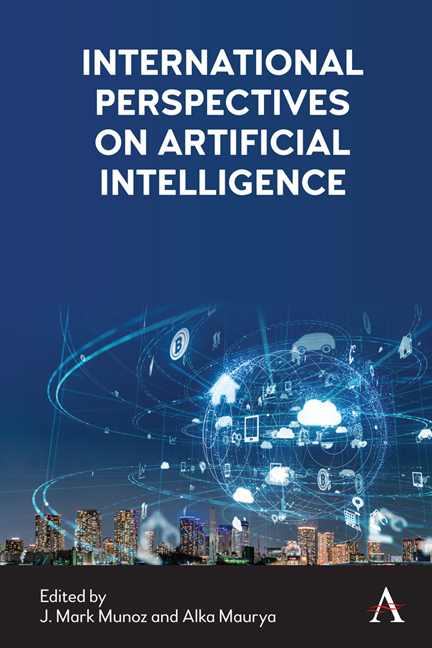Book contents
- Frontmatter
- Contents
- List of Illustrations
- List of Contributors
- Chapter 1 Introduction
- Chapter 2 Artificial Intelligence in the United States
- Chapter 3 Artificial Intelligence in Canada
- Chapter 4 The Mad Max Interceptor Experience in the UK: Artificial Intelligence in Mortgages
- Chapter 5 Artificial Intelligence in Germany: Strategy and Policy—the Impact of AI on German Economy
- Chapter 6 Japan's ‘Artificial-Intelligence Hospital’ Project: Can It Help the Ageing Population?
- Chapter 7 Artificial Intelligence in the Middle East European Countries
- Chapter 8 A Million Products for a Billion People: Artificial Intelligence in Consumer Industries in India
- Chapter 9 “All-In AI”: What is Compelling Companies in China to Bet the House on Artificial Intelligence?
- Chapter 10 Artificial Intelligence Research in Russia: Recovering from the Polar Winter
- Chapter 11 The Fourth Industrial Revolution in Africa
- Chapter 12 The Adoption of Artificial Intelligence within the Caribbean: Resuscitating the CARICOM's Single Market and Economy
- Chapter 13 Has Australia Been Late in Addressing the Artificial Intelligence Challenges?
- Chapter 14 Conclusion
- Index
Chapter 2 - Artificial Intelligence in the United States
Published online by Cambridge University Press: 02 March 2022
- Frontmatter
- Contents
- List of Illustrations
- List of Contributors
- Chapter 1 Introduction
- Chapter 2 Artificial Intelligence in the United States
- Chapter 3 Artificial Intelligence in Canada
- Chapter 4 The Mad Max Interceptor Experience in the UK: Artificial Intelligence in Mortgages
- Chapter 5 Artificial Intelligence in Germany: Strategy and Policy—the Impact of AI on German Economy
- Chapter 6 Japan's ‘Artificial-Intelligence Hospital’ Project: Can It Help the Ageing Population?
- Chapter 7 Artificial Intelligence in the Middle East European Countries
- Chapter 8 A Million Products for a Billion People: Artificial Intelligence in Consumer Industries in India
- Chapter 9 “All-In AI”: What is Compelling Companies in China to Bet the House on Artificial Intelligence?
- Chapter 10 Artificial Intelligence Research in Russia: Recovering from the Polar Winter
- Chapter 11 The Fourth Industrial Revolution in Africa
- Chapter 12 The Adoption of Artificial Intelligence within the Caribbean: Resuscitating the CARICOM's Single Market and Economy
- Chapter 13 Has Australia Been Late in Addressing the Artificial Intelligence Challenges?
- Chapter 14 Conclusion
- Index
Summary
What was once a figment of imagination in the minds of science fiction writers is now a ubiquitous reality in the United States of America. There are already various AI-endowed products in the market including: Garmin’s “auto-land” which can manage aircraft speed and engine performance or even descend towards the nearest airport and land a plane in case of a medical emergency (Pasztor 2020), and Clean Air, a technology that monitors and fixes air quality through fresh air, tempered, filtered and treated with ultraviolet light (McLaughlin 2020). In addition, primary healthcare is moving to a team of health-care professionals whose direct compensation is linked to keeping patients healthy by uploading data from home-monitoring equipment (Landro 2020). There are also trends for the future that are more indicative of science fiction: building a better athlete through tweaked brain circuits, culturing performance-boosting bacteria, and enhancing strength, speed and endurance by altering genes (Hotz and Hand 2020); seeking romance and friendship from artificial intelligence (AI) in the form of a chatbot for conversation during times of quarantine (Olson 2020); and producing meat in bioreactor tanks from animal cells rather than raising and slaughtering chickens, cattle and hogs (Bunge 2020).
As AI continues to develop, governments and practitioners must ensure that AI-enabled systems can work effectively with people and hold ideals that remain consistent with human values and aspirations; but this will not be easy. Increased attention has been drawn to these challenges and many believe that AI will create a better and wiser path forward for humankind. However, realistically one of the greatest challenges will be the risks involved for all citizens as AI continues to evolve and increase its impact on the workforce and society. The world is ever more competitive, and the underlying premise is that governments, industries and educational institutions that are ahead of the AI curve will reap the benefits of technological breakthroughs. The United States, in addition to many other advanced nations, aim to be at the forefront of these breakthroughs. This chapter will explore the good, the bad and the ugly, and then perhaps the beautiful of AI in the United States.
- Type
- Chapter
- Information
- Publisher: Anthem PressPrint publication year: 2022



